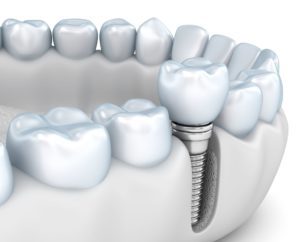Missing teeth can lead to a decline in your quality of life. You may feel unhappy with the gaps in your smile and the struggles to complete your usual oral functions if you have lost one or more teeth. But your jawbone may deteriorate if you do not seek help from your dentist to replace lost teeth.
Your dentist can restore your smile and preserve your jaw with long-lasting tooth replacement through implant dentistry. Read on to discover how dental implants can benefit the health of your jawbone after tooth loss.

What Happens to the Jawbone Following Tooth Loss?
In a healthy dental patient, a tooth is secure in its socket, and its root extends through the gums to the jaw. The tooth root stimulates the bone in the jaw, keeping it strong.
If a patient loses one or more teeth, then the jawbone no longer receives this stimulation. In its absence, it begins to deteriorate. This can lead to the appearance of facial sagging, shifting of remaining teeth, and other uncomfortable complications.
To prevent this type of damage, you will need to seek a dental treatment that replaces the lost teeth both above and below the gumline. A dental implant can offer these kinds of benefits for your oral health.
How Do Dental Implants Help Jawbone Health?
The structure of dental implant features titanium post anchors. A dentist surgically places these into the jaw. These will fuse to the jawbone as the surgical sites heal, creating a solid foundation to support prosthetic teeth.
The number of anchors you receive will depend on the types of dental implants you need as well as the number of implant fixtures. Your dentist can place all necessary anchors within one oral surgery.
The anchor replaces a missing tooth root, meaning the jawbone receives stimulation once again. This stops bone loss in the jaw and also encourages bone to regenerate if it has already deteriorated. These fixtures are long-lasting, giving restorative support for twenty or more years with proper care.
Patients will appreciate the preservation of their facial and dental structure with this treatment. Restorative dental solutions like removable dentures cannot replace teeth below the gumline and cannot offer this benefit.
Will My Jaw Support a Dental Implant?
Because dental implants use anchors that go into the jaw, you must have enough bone in the jaw to support this fixture. If too much bone has already been lost, you might not be able to successfully receive a dental implant.
Your dentist may suggest procedures that can rebuild the structure in the jaw, such as bone grafting, which may allow you to sustain an implant after you recover. If this is not feasible, you may need to seek an alternative tooth replacement treatment.
A dentist can evaluate the structure of your jaw and determine your eligibility for implant dentistry when you schedule a dental consultation. They can use x-ray imaging to examine your jawbone and its strength.
